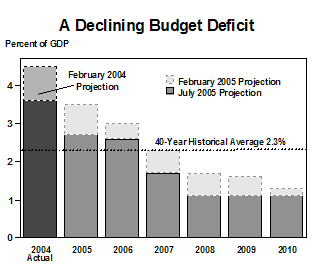
- Afghanistan
- Africa
- Budget Management
- Defense
- Economy
- Education
- Energy
- Environment
- Global Diplomacy
- Health Care
- Homeland Security
- Immigration
- International Trade
- Iraq
- Judicial Nominations
- Middle East
- National Security
- Veterans
|
Home >
News & Policies >
July 2005
|
For Immediate Release
July 13, 2005
President Bush’s Budget: Cutting The Deficit, Growing The Economy
Today, The Office Of Management And Budget Reported The FY2005 Budget Deficit Is Projected to Be $94 Billion Less Than Forecast Last February. At $333 billion, or 2.7 percent of GDP, it would be smaller than the deficits in 15 of the last 25 years as a percentage of GDP.
A Strong Economy Fueled By Tax Relief Is Generating Stronger-Than-Projected Revenues. After three straight years of declines due to economic weakness, tax receipts will have risen two consecutive years.
President Bush's Pro-Growth Policies Have Resulted In Steady Job Growth And Economic Expansion. The economy has created over 3.7 million jobs since May 2003, with steady job gains for each of the last 25 months - and more Americans are working than ever before.
The Unemployment Rate Fell To 5.0 Percent In June, The Lowest Since September 2001, and Lower Than the Average Rate of the 1970s, 1980s, and 1990s.
Background: Meeting The President's Budgetary Goals
Under The President's Policies, The Budget Deficit Is Forecast To Continue Falling. Projections show the deficit will fall to $162 billion in 2009, or 1.1 percent of GDP, significantly surpassing President Bush's goal of cutting the deficit in half from its FY 2004 projected peak of $521 billion, or 4.5 percent of GDP. A deficit of 1.1 percent of GDP would be well below the 40-year average of 2.3 percent of GDP.

The President's Budget Has Held The Line On Spending. President Bush and Congress have brought down the rate of growth of non-security spending in each year of his Administration. President Bush's 2006 Budget, released this February, was the first since the Reagan Administration to propose a cut in non-security discretionary spending, and also proposed to hold discretionary spending to below the expected rate of inflation. It also proposed savings in mandatory programs. Congress's Budget Resolution met these basic goals, and the Administration is working closely with Congress to hold to those limits in the appropriations process and to achieve the $35 billion in mandatory savings called for in the Budget Resolution.
To Keep Our Economy Strong And Achieve The President's Goal Of Cutting The Deficit In Half By 2009, We Must Continue The President's Agenda of Pro-Growth Policies And Responsible Spending Restraint.
Our Growing Economy Is Improving The Federal Budget
The Improved Fiscal Outlook Is Directly Tied To The Strength Of The Economy. With the help of tax relief, the U.S. economy is growing at a healthy pace, creating millions of new jobs and increasing business investment.
A Growing Economy Is Producing Greater Than Expected Revenues. The Mid-Session Review projects tax receipts will rise 14 percent from last year - the largest such year-over-year increase in 25 years. Receipts are on pace to rise $87 billion more than expected last February; spending was $7 billion less than expected.
The Projected Decline In The Deficit Includes Anticipated Costs. The new deficit forecasts take into account full extension of tax relief, war spending in 2005 and a substantial part of 2006, and the expected financing impact from creating voluntary personal retirement accounts under the President's Social Security reform proposal.
Addressing Social Security's Unfunded Obligations Is Critical To The Nation's Long-Term Fiscal Outlook. The Bush Administration is working with Congress to develop legislation that addresses the solvency of Social Security in a manner that protects low-income seniors and makes Social Security a better deal for young workers without raising the payroll tax rate.
# # #


